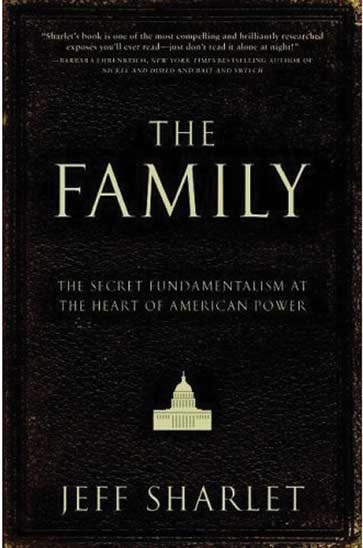 The next President of the United States will be inaugurated on 20 January 2009. A week or so later, by tradition, he will attend The National Prayer Breakfast, organised by The Fellowship Foundation. The ritual seems innocuous enough. But might this simple meeting of leaders from the world of American politics and faith be the most visible manifestation of a deeper secret society?
The next President of the United States will be inaugurated on 20 January 2009. A week or so later, by tradition, he will attend The National Prayer Breakfast, organised by The Fellowship Foundation. The ritual seems innocuous enough. But might this simple meeting of leaders from the world of American politics and faith be the most visible manifestation of a deeper secret society?
Jeff Sharlet thinks so. His book The Family: The Secret Fundamentalism at the Heart of American Power tasks itself with revealing the Foundation – also known as The Family of the book’s title – as an unlikely prime mover in the rise of American evangelicalism. Their first Breakfast took place shortly after the election of President Eisenhower in 1952. The general was not much of a churchgoer. A young Billy Graham advised him, before his tilt for the White House, that the American people wouldn’t stand for a seemingly agnostic leader. Eisenhower promised a public display of faith. The Prayer Breakfast was born.
Graham was, at that time, an acolyte of Norwegian immigrant Abraham Vereide, more commonly known as Abram. Several decades earlier Abram had received a visitation from God. The result was what Sharlet terms “the Idea”: Abram thought he could best serve America’s poor by tending to its rich. Over the next decades he would work to set up high-levels groups of wealthy, powerful Christian evangelicals in America’s boardrooms and legislatures. When Graham suggested the Prayer Breakfast to Abram, the group knew it had arrived in the Oval Office.
In public The Family provides spiritual advice to America’s leaders. Sharlet’s story rests on his ability to prove that underneath, this mix of the Masons, Opus Dei and the Kiwanis club planned to turn the United States into a theocracy. Bold claims for its influence are made, while a deliberately post 9/11 vocabulary, speaking of the “prayer cells” and “networks of meetings”, describes something akin to a Christian terrorist outfit. Sharlet thinks the language apt: “The Family’s long-term project of a worldwide Christian government is more ambitious than al-Qaeda’s dream of a Sunni empire.”
What a book it promises to be: a real life Da Vinci Code, the inside scoop on how a secret society plotted and succeeded in taking over America, bridging the separation of the church and state as it went. But, ultimately, it fails to persuade. The first problem is of style. The dust jacket promises a mix of original reporting and historical analysis. What the reader gets, however, is a mess. Sharlet is at his best when doing straight journalistic description. His history is less good: the book opens with a hundred pages of often confusing backstory describing various figures from America’s 18th- and 19th-century religious awakenings. The meat of the story is equally baffling, jumping from place to place and person to person. In amongst all of this, the story of The Family – its organisation, influence, achievements and development – gets lost.
Such stylistic swerves would matter less if his bolder claims convinced. But they do not. Early in the book Sharlet asks rhetorically if the group could really be “nothing but country club fundamentalism, worth little more attention than [the] Rotary, or the Freemasons”. It’s a bar he never clears. Intriguing examples of notable figures involved are provided, from contemporary Senators to Richard Nixon’s fixer Charles Colson, who became what he called a “brother, a member of the underground” after the disgrace of Watergate. But The Family never seems to play a sufficiently important part in shaping political events to justify the conspiracy he claims to unveil.
In the penultimate chapters Sharlet turns away from The Family entirely, to begin a free-form ramble about misunderstandings of modern fundamentalism. “We keep trying to explain [it] away,” he begins, but most modern observers misunderstand that “the revivals that have been sweeping the nation with generational regularity since its inception are not flare-ups, but the natural temperature of American empire.” It’s certainly an odd conclusion for an author who has spent the previous 400 pages trying to convince that, far from being a natural state of affairs, America’s contemporary religiosity had been caused by a ruthlessly organised elite sect poking its pious fingers into the affairs of the American state.
The original fundamentalists came from a tradition of separation, keeping themselves apart from a sinful world. Modernity made this position unsustainable, and led to a new religious engagement with politics. Groups like The Family are better seen as part of – but not the cause of – this wider change, one that ultimately led to the activist religious right of the last two decades. Sharlet’s problem is that the story of their rise is well known. A quarter of Americans are evangelical Protestants. Any number of highly vocal groups have helped to ensure their voices are heard. America’s faith leaders are rarely inclined to hide the light of their political influence under a bushel. And their very public, often brazen influence is ultimately more interesting, and more convincing, than this half-convincing conspiracy yarn.
The Family is published by Harper
Read Jeff Sharlet's response to James Crabtree's criticisms of his book

